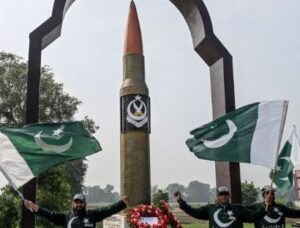
Pakistan’s Nuclear Capability and Usage Policy
Introduction
Pakistan’s nuclear capability has been a subject of international interest and concern for several decades. Since conducting its first nuclear tests in 1998, Pakistan has emerged as a nuclear-armed state in a volatile region, adding complexity to the already delicate security dynamics of South Asia. This article delves into Pakistan’s nuclear capability, its rationale for acquiring nuclear weapons, the evolution of its nuclear doctrine, and the country’s stated usage policy.
The Rationale for Nuclear Weapons
Pakistan’s pursuit of nuclear weapons can be traced back to its security concerns, particularly its longstanding rivalry with neighboring India. The nuclearization of the Indian subcontinent began with India’s nuclear tests in 1974, which Pakistan perceived as a threat to its security and strategic parity. Consequently, Pakistan embarked on its own nuclear program to ensure deterrence against potential aggression from India.
Pakistan’s nuclear capability is primarily viewed as a deterrent rather than an offensive tool. The country’s leaders argue that possessing nuclear weapons helps maintain strategic stability in South Asia, preventing any large-scale conventional conflict that could escalate to nuclear war. By possessing a credible nuclear deterrent, Pakistan aims to dissuade any aggressive actions by adversaries and protect its territorial integrity.
Evolution of Nuclear Doctrine
Pakistan’s nuclear doctrine has evolved since it first acquired nuclear weapons. Initially, the country maintained a policy of ambiguity, neither openly confirming nor denying the possession of nuclear weapons. This approach was aimed at keeping adversaries uncertain about the consequences of their actions, thus enhancing the credibility of Pakistan’s deterrent.
However, in 2002, Pakistan took a significant step towards transparency by publicly articulating its nuclear doctrine. The doctrine, known as “credible minimum deterrence,” is grounded in three key principles:
First-Use Policy: Pakistan declared that it reserves the right to use nuclear weapons in response to an overwhelming conventional attack, including a threat to the country’s territorial integrity. This first-use policy was intended to counterbalance India’s conventional military superiority.
Non-Use against Non-Nuclear States: Pakistan pledged not to use nuclear weapons against non-nuclear-armed states. This commitment was aimed at preventing nuclear proliferation and assuring non-nuclear states that they need not fear a nuclear attack from Pakistan.
Command and Control: Pakistan emphasized that its nuclear weapons were under secure and robust command-and-control mechanisms, minimizing the risk of unauthorized use or nuclear proliferation.
Challenges and Concerns
Despite Pakistan’s articulated nuclear usage policy, there are several concerns that the international community raises regarding the country’s nuclear capabilities.
Risk of Accidents or Unauthorized Use: Critics worry that Pakistan’s nuclear weapons could fall into the wrong hands due to internal instability or potential security breaches within its military and intelligence apparatus.
Nuclear Arms Race with India: The presence of nuclear weapons in both India and Pakistan has led to an ongoing arms race, with both countries continuously modernizing their nuclear arsenals. This escalation raises concerns about inadvertent or deliberate nuclear confrontations.
Terrorism and Proliferation Risks: Pakistan’s struggle with domestic terrorism and the existence of extremist elements within its borders raise concerns about the potential theft of nuclear materials or technology by terrorist organizations.
Regional Stability: The presence of nuclear weapons in South Asia adds complexity to regional stability. Tensions between India and Pakistan have the potential to escalate rapidly, with grave consequences for the entire region.
Conclusion
Pakistan’s nuclear capability has undoubtedly added an extra layer of complexity to South Asia’s security landscape. The country’s nuclear program is deeply rooted in its quest for security and deterrence against potential threats. While Pakistan has articulated its nuclear usage policy, concerns persist regarding the safety, security, and regional implications of its nuclear arsenal. The international community continues to closely monitor Pakistan’s nuclear developments and calls for responsible behavior, risk reduction, and dialogue between Pakistan and India to ensure regional stability and peace.









